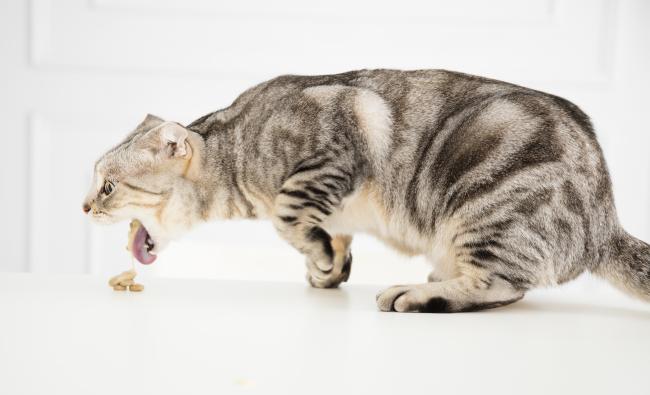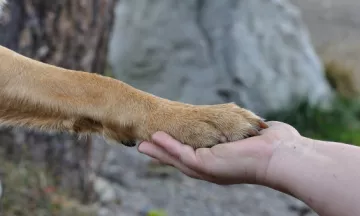Many cats regularly throw up after eating. This is normal in most cases, but sometimes vomiting can also indicate underlying health problems. To keep your cat healthy it is important to keep a close eye on your cat's upset stomach and its contents.
Hairballs and vomiting
Cats swallow a lot of fur from grooming, which can potentially be vomited up in furball form.
Furballs can happen to any cat, but does your cat experience them too often? It can help to:
- Brush your cat regularly to remove excess fur
- Spread their meal over several small meals per day
- Provide cat grass, which makes it easier for the cat to vomit and supports a healthy intestinal function.
- Speak to your vet about whether your cat's diet might be contributing to fur balls or needs adjusting

Eaten something wrong
Cats can also vomit from eating something they shouldn't have: such as garbage from the bin, leftovers from the kitchen or something else nasty. This is usually not a problem, but it is important that you monitor your cat afterwards. If the cat is lively and cheerful again after vomiting, there is usually nothing to worry about: just clean up the mess and you're done. Does your cat stay sick and apathetic? Then call in the vet.
Eating too fast
Cats can throw up after they've eaten too fast or eaten too much food.
Here are some ways to slow a hungry cat down:
- Make sure the cat eats alone in a quiet place with no other animals nearby
- Give the cat several small meals per day
- Give your cat smaller pieces of food - no large chunks!
Extra tip: do you feed your cat food straight from the fridge? The chill can upset their sensitive stomach, so feed your cat once the food has reached room temperature.
Cats that are hungry often eat a large amount of food quickly, causing them to vomit. Does your cat also throw up after eating just a little food? This could be a sign of illness, so consult your veterinarian immediately.
Acute or Chronic vomiting: illness or poisoning
If your cat occasionally throws up due to a hairball or eating too quickly, there is no reason to worry. However, if the frequency of vomiting changes, there may be something else going on. Two possibilities are:
Acute vomiting: There hen a cat suddenly vomits a lot and there are other symptoms of illness, it can be poisoning or illness. In addition to acute vomiting you also see listlessness, your cat has diarrhea, he drinks or eats very little or extra, a lot of pee or difficult pee then there is cause for concern. Call the vet right away - the risk of dehydration is high.
Read more about which house plants are toxic to my cat?
Chronic vomiting: If the cat vomits more and for longer than normal (more than 3 consecutive days), this may indicate an underlying medical issue. There may be a problem with their organs (for example, their stomach, intestines, liver or thyroid gland) or there may be an infection (such as worms or a virus). If this happens, call your vet.
When you call the vet, it is important to pass on as much information as possible. Observe your cat's behaviour and their vomit before you clean it up, in case the vet should ask for further details or a description of what you see. Read more about when to take your cat to the vet.

Why do cats sometimes eat their vomit?
Harmless vomiting can happen if a cat gobbles up their meal too quickly, usually within 2 hours of eating. As it hasn't been in the stomach for long, it will look a bit undigested and come up really easily. Some cats eat it back up, which can sound a bit gross but is totally normal according to cat behaviourists.
Vomit that is reported from illness or poisoning looks more 'digested' and often has a yellowish colour. You might notice your cat cough more violently, with visible stomach contractions. If this happens, clean up the vomit as quickly as possible to prevent your cat from eating it again.






